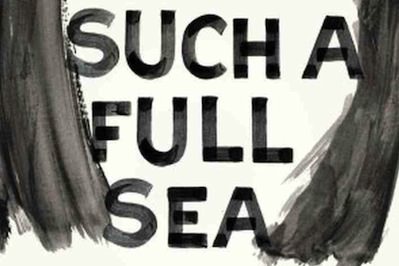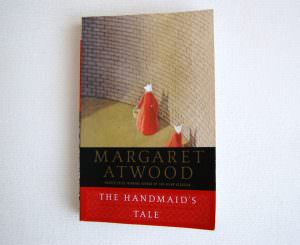On Such a Full Sea
Chang-rae Lee's new novel is a haunting, deeply unnerving critique of a spiritually stunted community kept satisfied with basic comforts and the promise of protection from a threatening world. (Are you getting all this, NSA?) Chang-rae Lee's new novel is a haunting, unnerving critique of a spiritually stunted community kept satisfied with basic comforts and the promise of protection from a threatening world. Riverhead
Riverhead
Riverhead
|
To see long excerpts from “On Such a Full Sea” at Google Books, click here. |
“On Such a Full Sea” A book by Chang-rae Lee
The most striking dystopian novels sound an alarm, focus our attention and even change the language. “The Handmaid’s Tale” crystallized our fears about reproductive control; “Fahrenheit 451” still flames discussions of censorship; and “1984” is the lens through which we watch the Obama administration watching us.
Chang-rae Lee’s unsettling new novel, “On Such a Full Sea,” arrives from that same frightening realm of total oversight and pinched individuality. But it’s a subtler, quieter affair, more surreal than horrifying. Lee whispers the inchoate anxieties about modern life. If Cormac McCarthy’s “The Road” stirred nightmares about our destiny, “On Such a Full Sea” is more likely to draw you off into troubled daydreams about this afternoon.
Although it’s too late to express surprise about another literary novelist venturing into the tall grass of genre fiction, Lee’s range is astonishing. Three of his novels — including “The Surrendered,” which was a finalist for the 2011 Pulitzer Prize — deal with war or alienation, but try reconciling those dark masterworks with his witty, big-hearted “Aloft” (2004), which confidently strolled into John Updike’s suburban milieu. And now he’s published a story set in our bleak, overheated future.
“On Such a Full Sea” opens on a wasted landscape where the remnants of civilization survive in strictly stratified compounds walled off from the lawless scrap heap of North America. In some ways, it’s a familiar tale: a lone radical’s picaresque journey through a repressive society ripe for revolution. But at every turn, Lee thwarts our expectations.
“Most would agree that any rational person would leap at the chance of living here,” begins the plural narrator, the communal “we” of B-Mor, “once known as Baltimore.” Nearly 100 years ago, their ancestors were shipped in from China to live on the Eastern Shore, where they raise perfect fish in carefully controlled tanks. “Stability is all here in B-Mor,” we’re told. “It’s what we ultimately produce, day by night by day, both what we grow for consumption and how we are organized in neighborhood teams, the bonds of blood or sexual love relied upon equally to support our constitution. In this difficult era the most valuable commodity is the unfailing turn of the hours and how they retrieve for us the known harbor of yesterday.”
That voice, with its strange blend of orthodoxy and poetry, wonder and lament, casts the hypnotic spell of “On Such a Full Sea.” Lee has shifted not just the time and the social customs, but the ideals and the language of these people, to produce that uncanny effect of familiarity and alienness that the most troubling dystopian stories share.
This is “the tale of Fan, the young woman whose cause has been taken up by a startling number of us.” Fan’s job, we learn, “was to husband and nurture the valuable fish that allow our community to do so well in this mostly difficult world.” Sixteen years old, she enjoyed her job, and she was devoted to the fish, but otherwise there was nothing particularly remarkable about her in this monochromatic culture. Except that she loved a gangly young man named Reg, and their pure affection for each other charmed and brightened everyone who saw them together.
Then one day “Reg was gone,” without warning or explanation. And so begins Fan’s journey to find him — a quest across the hostile “open counties,” a Mad Max land of shantytowns and murderous gangs (lucky victims are kept as slaves). She heads off without permission, protection or any information about Reg’s whereabouts. For the people she leaves behind, it’s an unthinkable risk: “We’re no longer fit for any harsher brand of life, we admit that readily, and simply imagining ourselves existing beyond the gates is enough to induce a swampy tingle in the underarms, a gaining chill in the gut.”
But they do imagine her quest — in rich and sometimes lurid detail. “The reach of our thoughts has a near ceiling,” the narrators say, but Fan’s example pushes against that mental limit. What follows is the story of Fan’s inexorable search for her young lover, a story constructed from rumors and gossip, speculation and dreams. Even while reminding us parenthetically that they know nothing about what actually happened to her, the tale takes shape. “We can’t help but build upon what is known,” the narrators say, “our elaborations not fantastical or untrue but at times vulnerable to our wishes for her, and for ourselves.” Unprotected and alone for the first time in her life, Fan falls prey to people who have clustered together in varying degrees of compassion and savagery, while back home her curious comrades hope she won’t “become sausage.”
What a strange novel this is, with its erratic pacing, its haphazard mingling of adventure and philosophical reflection, its constant questioning of its own veracity. As Fan’s search progresses from one near-death escape to another, we begin to understand that we’re witnessing the creation of a legend: an unlikely heroine who answers the needs of a people suffocating under the ideals of self-sacrifice and stability. In the narrators’ plural voice, we can hear the competing strains of censure and enthusiasm, their pious condemnation of Fan’s radical act along with their delight that such courage is still possible. Eventually, Fan’s “boosters” commit tiny acts of vandalism: Graffiti appear briefly on the streets; a new sense of life outside their neat streets starts to seem imaginable. But “doesn’t B-Mor as conceived and developed and now constituted obviate the need for such purposeful dreaming?” the narrators ask, answering their own poignant question in the silence that follows.It’s a haunting critique of a spiritually stunted community kept satisfied with basic comforts and the promise of protection from a threatening world. (Are you getting all this, NSA?) But gradually, the novel’s focus shifts toward a wealthy settlement, a Charter, where Fan believes her lover has been taken for medical research. That society poses an even more disconcerting vision. After all, we’ve seen oppressive overlords before in dystopian fiction, but what Fan discovers is something far more benevolent — and therefore more insidious.
The privileged members of the Charter are fixated on risk. Standing at the pinnacle means constantly itching with the fear of failing, of going broke, of getting sick, of growing old. “Charters are famously nervous,” the narrators say, “for despite their wealth and security and self-satisfied demeanors, they are obsessed with minimizing hazards of any kind, and are perhaps wracked most of all by the finally unknowable dangers of what they ingest.” The people of the Charter are devoted to the fantasy of their own goodness, but beneath that delusion, they burn in a white fire of anxiety about the purity of their vegetables, the health of their organs, the status of their careers, the flow of their money. They’re convinced that every atom of their lives can be controlled if only they work hard enough. Who wouldn’t they betray to protect themselves?
Once again, Lee creates an impossibly foreign world, and with his muted, elegiac voice shows us living there. It’s a brilliant, deeply unnerving portrait that might even distract you for a moment when you’re battling a svelte yoga fanatic at Whole Foods for the last bag of organically grown quinoa.
Run, Fan, run.
Ron Charles is the deputy editor of The Washington Post’s Book World.
©2014, Washington Post Book World Service/Washington Post Writers Group
Your support matters…Independent journalism is under threat and overshadowed by heavily funded mainstream media.
You can help level the playing field. Become a member.
Your tax-deductible contribution keeps us digging beneath the headlines to give you thought-provoking, investigative reporting and analysis that unearths what's really happening- without compromise.
Give today to support our courageous, independent journalists.






You need to be a supporter to comment.
There are currently no responses to this article.
Be the first to respond.